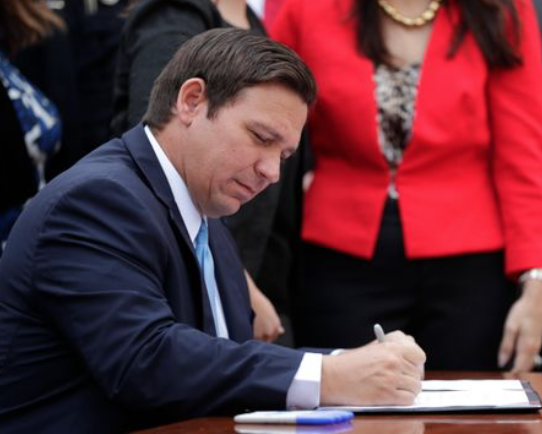By John Haughey
The Center Square
June 3, 2021

Florida lawmakers last month sent Gov. Ron DeSantis a $101.5 billion Fiscal Year 2022 budget that, bloated by federal pandemic relief funds, increased spending by nearly 10% over this year’s $92.2 billion budget.
On Wednesday, DeSantis signed a $100 billion FY22 spending plan into law, vetoing 152 expenditures and trimming $1.5 billion from the budget, including $1.35 billion from federal funds received under the American Rescue Plan Act of 2021.
“I’m proud to sign the Florida Leads budget that continues to exemplify Florida’s continued resolve and unshakeable economic foundation, while establishing Florida’s position as a nationwide leader in education, protecting our environment, creating a resilient economy, and ensuring public safety,” DeSantis said. “We did all this while maintaining strong fiscal reserves and lowering taxes to make sure Florida families benefit this year and for decades to come.”
Among pandemic-induced budget increases is a $4.3 billion federal boost to account for 1 million new Medicaid enrollees over the last year within the state’s $44 billion health care budget.
The budget spends $22.8 billion for K-12 education and includes an increase of $53 in the base student allocation, $120 million for mental health initiatives and $550 million to continue raising the minimum K-12 teacher salary to the goal of $47,500.
The FY22 spending plan, which goes into effect July 1, leaves $9.5 billion in reserves and again commits $625 million for Everglades restoration and water quality projects and allocates $500 million in federal funding for the newly created Resilient Florida program, up to $500 million for the Wastewater Grant Program and up to $300 million for land acquisition to protect wildlife corridors.
The budget commits $10.3 billion to the Florida Department of Transportation, including $9.44 billion for the State Transportation Work Program and invests $37.5 million in cybersecurity.
Of the 152 line-item cuts outlined in a five-page veto list, eight erase expenditures of $1 million or more, including $2 million each for a Lake County Public safety radio infrastructure program and for a Hormonal Long-Acting Reversible Contraception Program (HLARC).
By far, however, the largest veto was $1 billion in federal American Rescue Plan (ARP) dollars to create an Emergency Preparedness & Response Fund – something DeSantis strongly espoused.
DeSantis said the creation of the fund would have clashed with federal guidance issued on May 10, nearly two weeks after lawmakers agreed to earmark $1 billion in ARP aid for the emergency fund and $350 million in ARP money for the state’s budget stabilization fund.
“We were going to run into the risk of having the feds come after us for it,” DeSantis said. “The problem is, between the time I called for it, and the Legislature passed it, and the present, the federal government issued guidance on how you could use the funds.”
The May 10 guidance states ARP money can support COVID-19 response efforts, f “immediate economic stabilization” and “systemic public health and economic challenges that have contributed to the unequal impact of the pandemic.”
The updated guidance would classify such an ARP allocation a “grant” that would be subject to normal procurement, which DeSantis said would belie the whole reason for the fund.
Unspent ARP funds will be allocated next fiscal year. Guidelines for ARP funds say the state has until 2024 to spend the money.
DeSantis said he will ask lawmakers to bring back the fund for adoption next session.
“I do think having an emergency response fund separate from general revenue is a good idea,” DeSantis said. “We’ll see what we can do” next year.

